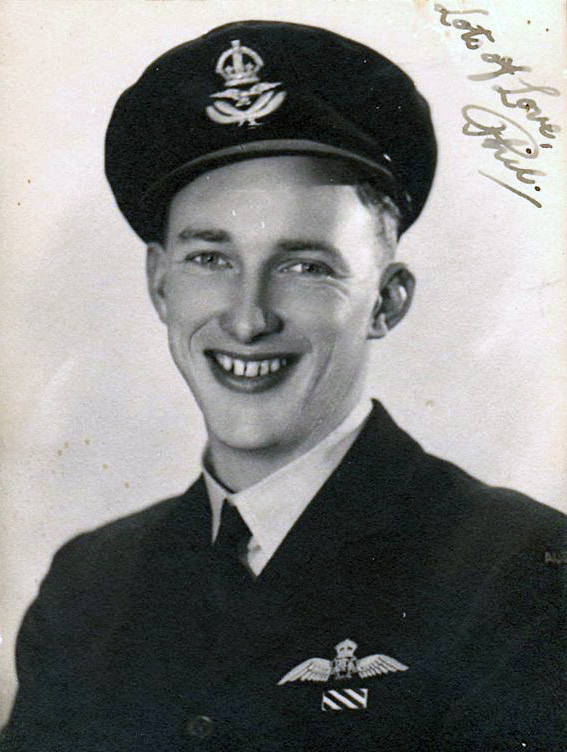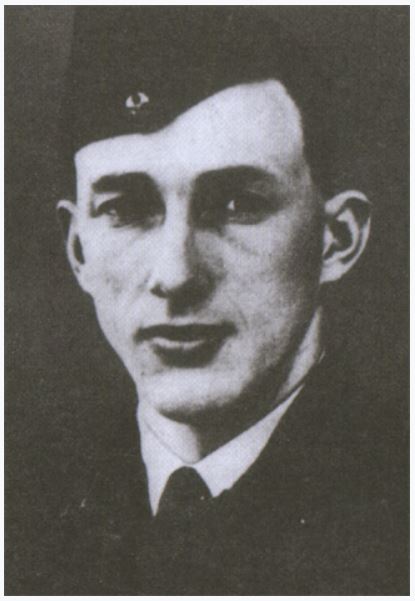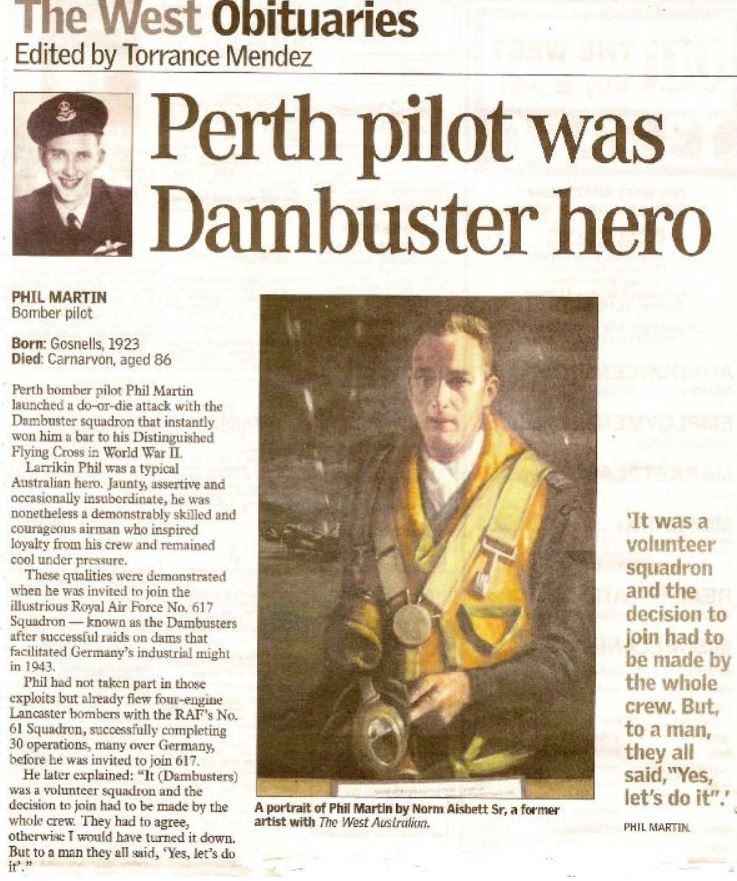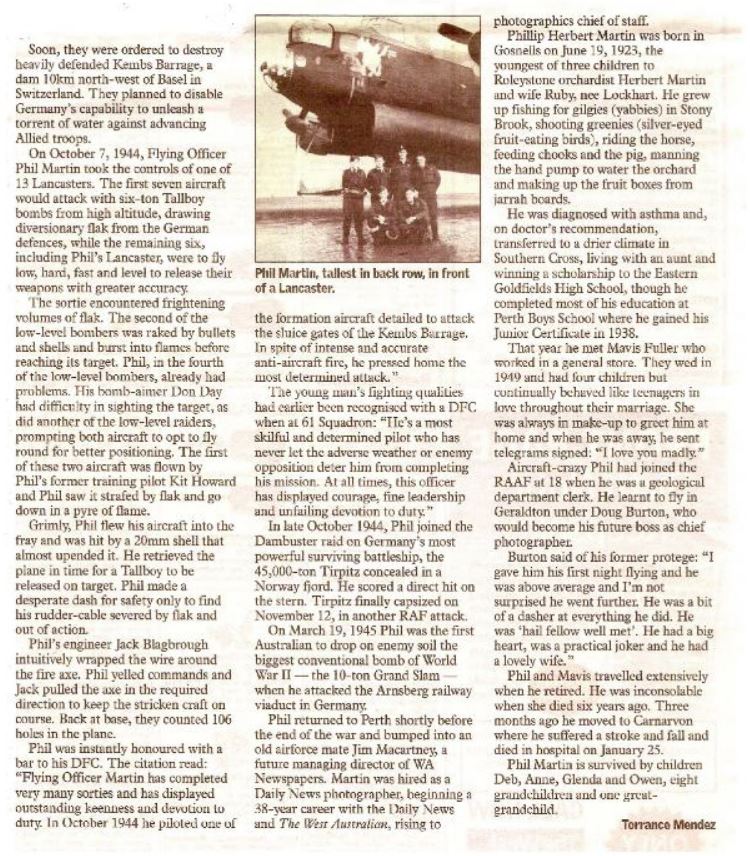Difference between revisions of "Phillip Herbert Martin DFC & Bar"
From Our Contribution
(→War Service) |
(→War Service) |
||
| (10 intermediate revisions by the same user not shown) | |||
| Line 89: | Line 89: | ||
==War Service== | ==War Service== | ||
| − | On 26 Apr 1942 Phillip enlisted | + | On 26 Apr 1942 Phillip enlisted in the RAAF at [[No. 4 RAAF Recruiting Centre]] as an Aircraftsman. The same day he was posted to [[No. 5 Initial Training School RAAF]] at Clontarf where he was promoted Leading Aircraftsman on 18 Jul 1942. His next move was on 21 Sep 1942 when he joined the [[No. 9 Elementary Flying Training School RAAF]] at Cunderdin. Having completed his early flying training, on 23 Nov 1942 Phillip was transferred to the [[No. 4 Service Flying Training School RAAF]] at Geraldton where at the completion of his training on 11 Mar 1943 he was promoted Sergeant. |
| − | He returned to Perth posted to the [[No. 5 Embarkation Depot RAAF]] awaiting a posting to an operational unit. However, on 14 Apr 1943 he was posted to the [[No. 1 Embarkation Depot RAAF]] in Ascot Vale, Victoria, having been chosen to serve in the UK. The | + | He returned to Perth on 22 Mar 1943, posted to the [[No. 5 Embarkation Depot RAAF]] awaiting a posting to an operational unit. However, on 14 Apr 1943 he was posted to the [[No. 1 Embarkation Depot RAAF]] in Ascot Vale, Victoria, having been chosen to serve in the UK. The next day he moved on to the [[No. 2 Embarkation Depot RAAF]] at Bradfield Park in New South Wales. Finally on 16 Apr 1943 he embarked for the UK in Brisbane, disembarking there on 28 May 1943. |
| − | On arrival he was posted to the [[No. 11 Personnel | + | On arrival he was posted to the [[No. 11 Personnel Despatch & Receiving Centre RAAF]]. On 6 Jul 1943 Phillip joined the [[No. 15 (Pilots) Advanced Flying Unit RAF]] at RAF Caistor in Lincolnshire. with this stage of his training completed, on 17 Aug 1943 he was posted to ''HQ No 50 Group RAF'' for further training and he was promoted to Flight Sergeant on 11 Sep 1943. On 2 Nov 1943 he was posted to the [[No. 17 Operational Training Unit RAF]] at RAF Siverstone to undertake a conversion course on [[Vickers Wellington]] bombers. Following training, on 16 Feb 1944 Phillip was posted to ''No. 51 Base'', where on 17 Apr 1944 Phillip was promoted to Pilot Officer, after which, on 21 May 1944, he was posted to [[No. 61 Squadron RAF]] who were operating [[Avro Lancaster]] bombers. |
| − | Following a period of operational service with 61 Squadron during which he and his crew flew 30 missions, he earned a Distinguished Flying Cross. Phillip and his crew were invited to join the elite [[617 Squadron RAF]], known as the ''Dambusters'' for their 1943 efforts against dams in the Ruhr Valley. They joined the Squadron on 1 Sep 1944 and participated in specialist and precision-bombing roles, including the use of the enormous "Tallboy" and "Grand Slam" ground-penetrating earthquake bombs flying [[Avro Lancaster]] aircraft. These were used on targets such as concrete U-boat shelters and bridges. After many failed attempts were made on The Dortmund-Ems Canal in 1943, it was finally breached with Tallboys in September 1944. | + | Following a period of operational service with ''61 Squadron'' during which he and his crew flew 30 missions, he earned a Distinguished Flying Cross. Phillip and his crew were invited to join the elite [[No. 617 Squadron RAF]], known as the ''Dambusters'' for their 1943 efforts against dams in the Ruhr Valley. They joined the Squadron on 1 Sep 1944 and participated in specialist and precision-bombing roles, including the use of the enormous "Tallboy" and "Grand Slam" ground-penetrating earthquake bombs flying [[Avro Lancaster]] aircraft. These were used on targets such as concrete U-boat shelters and bridges. After many failed attempts were made on The Dortmund-Ems Canal in 1943, it was finally breached with Tallboys in September 1944. |
| − | A major threat to Bristish shipping was the German Battleship, ''Tirpitz'' sheltering in Norwegian fjords after a number of unsuccessful attempts to sink her. The task was passed on to No. IX and No. 617 Squadrons; which were temperarily deployed to Yagodnik, near Archangel, a staging base in Russia as the ''Tirpitz'' was beyond the range of UK airfields. On 15 Sep 1944, the RAF bombers attacked the ''Tirpitz'' with talboy bombs, one of which struck the battleship in the forecastle, rendering her unseaworthy, so she was sent to the Tromsø fjord where temporary repairs were made and she was anchored as a floating battery. This fjord was now within the range of bombers operating from Scotland. | + | A major threat to Bristish shipping was the German Battleship, ''Tirpitz'' sheltering in Norwegian fjords after she had survived a number of unsuccessful attempts to sink her. The task was passed on to No. IX and No. 617 Squadrons; which were temperarily deployed to Yagodnik, near Archangel, a staging base in Russia as the ''Tirpitz'' was beyond the range of UK airfields. On 15 Sep 1944, the RAF bombers attacked the ''Tirpitz'' with talboy bombs, one of which struck the battleship in the forecastle, rendering her unseaworthy, so she was sent to the Tromsø fjord where temporary repairs were made and she was anchored as a floating battery. This fjord was now within the range of bombers operating from Scotland. |
| Line 107: | Line 107: | ||
| − | On 21 May 1945 with his war over, Phillip was posted to [[No. 11 Personnel | + | On 21 May 1945 with his war over, Phillip was posted to [[No. 11 Personnel Despatch & Receiving Centre RAAF]] to arrange his return to Australia. Phillip embarked on 30 May 1945, and disembarked in Sydney on 7 Jul 1945. He was taken to the [[No. 2 Personnel Depot RAAF]] on the same day before being posted on 1 Aug 1945 to the [[No. 5 Personnel Depot RAAF]] in Perth. Phillip's appointment was terminated on 18 Jan 1946. |
==Award Comment== | ==Award Comment== | ||
Latest revision as of 00:21, 9 May 2024
 | |
 | |
| Personal Information | |
|---|---|
| Date of Birth | 19 Jul 1923 |
| Place of Birth | Gosnells, Western Australia |
| Death | 25 Jan 2010, aged 86 |
| Place of Death | Carnarvon, Western Australia |
| Age at Enlistment | 18 years, 9 months |
| Occupation | clerk |
| Religion | Church of England |
| Address | Kelmscott, Western Australia |
| Next of Kin | Father , Mr Herbert Martin |
| Military Information | |
| Reg Number | 427006 |
| Date of Enlistment | 26 Apr 1942 |
| Rank | Flying Officer |
| Unit/Formation | No. 617 Squadron RAF |
| Post War Details | |
| Fate | Returned to Australia |
| Monument(s) | Roleystone Roll of Honour |
| Medals |
Distinguished Flying Cross 1939-45 Star Aircrew Europe Star France & Germany Star |
Pre War
Diagnosed with asthma, Phil spent part of his childhood at Southern Cross living with an aunt. He won a scholarship to the Eastern Goldfields High School, but later attended the Perth boys School until 1938.
War Service
On 26 Apr 1942 Phillip enlisted in the RAAF at No. 4 RAAF Recruiting Centre as an Aircraftsman. The same day he was posted to No. 5 Initial Training School RAAF at Clontarf where he was promoted Leading Aircraftsman on 18 Jul 1942. His next move was on 21 Sep 1942 when he joined the No. 9 Elementary Flying Training School RAAF at Cunderdin. Having completed his early flying training, on 23 Nov 1942 Phillip was transferred to the No. 4 Service Flying Training School RAAF at Geraldton where at the completion of his training on 11 Mar 1943 he was promoted Sergeant.
He returned to Perth on 22 Mar 1943, posted to the No. 5 Embarkation Depot RAAF awaiting a posting to an operational unit. However, on 14 Apr 1943 he was posted to the No. 1 Embarkation Depot RAAF in Ascot Vale, Victoria, having been chosen to serve in the UK. The next day he moved on to the No. 2 Embarkation Depot RAAF at Bradfield Park in New South Wales. Finally on 16 Apr 1943 he embarked for the UK in Brisbane, disembarking there on 28 May 1943.
On arrival he was posted to the No. 11 Personnel Despatch & Receiving Centre RAAF. On 6 Jul 1943 Phillip joined the No. 15 (Pilots) Advanced Flying Unit RAF at RAF Caistor in Lincolnshire. with this stage of his training completed, on 17 Aug 1943 he was posted to HQ No 50 Group RAF for further training and he was promoted to Flight Sergeant on 11 Sep 1943. On 2 Nov 1943 he was posted to the No. 17 Operational Training Unit RAF at RAF Siverstone to undertake a conversion course on Vickers Wellington bombers. Following training, on 16 Feb 1944 Phillip was posted to No. 51 Base, where on 17 Apr 1944 Phillip was promoted to Pilot Officer, after which, on 21 May 1944, he was posted to No. 61 Squadron RAF who were operating Avro Lancaster bombers.
Following a period of operational service with 61 Squadron during which he and his crew flew 30 missions, he earned a Distinguished Flying Cross. Phillip and his crew were invited to join the elite No. 617 Squadron RAF, known as the Dambusters for their 1943 efforts against dams in the Ruhr Valley. They joined the Squadron on 1 Sep 1944 and participated in specialist and precision-bombing roles, including the use of the enormous "Tallboy" and "Grand Slam" ground-penetrating earthquake bombs flying Avro Lancaster aircraft. These were used on targets such as concrete U-boat shelters and bridges. After many failed attempts were made on The Dortmund-Ems Canal in 1943, it was finally breached with Tallboys in September 1944.
A major threat to Bristish shipping was the German Battleship, Tirpitz sheltering in Norwegian fjords after she had survived a number of unsuccessful attempts to sink her. The task was passed on to No. IX and No. 617 Squadrons; which were temperarily deployed to Yagodnik, near Archangel, a staging base in Russia as the Tirpitz was beyond the range of UK airfields. On 15 Sep 1944, the RAF bombers attacked the Tirpitz with talboy bombs, one of which struck the battleship in the forecastle, rendering her unseaworthy, so she was sent to the Tromsø fjord where temporary repairs were made and she was anchored as a floating battery. This fjord was now within the range of bombers operating from Scotland.
On 7 Oct 1944, Phillip's aircraft was severly damaged in an attack on Kembs Barrage, but he was able to nurse the aircraft back to base, earning a Bar to his DFC On 17 Oct 1944 Phillip was promoted Flying Officer and finally on 12 Nov 1944, the two squadrons again attacked Tirpitz. The first bombs missed their target, but following aircraft scored two direct hits in quick succession. Within ten minutes of the first bomb hitting the Tirpitz, a magazine exploded, killing more than half the crew and sinking the ship.
On 21 May 1945 with his war over, Phillip was posted to No. 11 Personnel Despatch & Receiving Centre RAAF to arrange his return to Australia. Phillip embarked on 30 May 1945, and disembarked in Sydney on 7 Jul 1945. He was taken to the No. 2 Personnel Depot RAAF on the same day before being posted on 1 Aug 1945 to the No. 5 Personnel Depot RAAF in Perth. Phillip's appointment was terminated on 18 Jan 1946.
Award Comment
"For courage and devotion to duty in flying operations against the enemy". [1] The more detailed citation reads:
He's a most skilful and determined pilot who has never let the adverse weather or enemy opposition deter him from completing his mission. At all times this officer has displayed courage, fine leadership and unfailing devotion to duty.
The same wording was used for the award of a Bar to his DFC. [2] This sortie was the attack on Kembs Barrage, and the more detailed citation reads:
Flying Officer Martin has completed very many sorties and has displayed outstanding keenness and devotion to duty. In October 1944 he piloted one of the formation aircraft detailed to attack the sluice gates of the Kembs Barrage. In spite of intense and accurate anti-aircraft fire, he pressed home the most determined attack.
Post War
During 1946 Phillip was a member of a musical group in Roleystone known as 'The Hilarions'. On 5 Feb 1949 Phillip married another member of the group, Mavis Irene Fuller in St Andrews Church, Perth. Born in 1921, Mavis died on 15 Jun 2003 at Mt Nasura, aged 81. They had four children, Deb, Anne, Glenda and Owen.
Electoral Roll entries: 1949 - 1958 at River road, Kelmscott, photographer; 1968 - 1980 at 8 Dale street, Kelmscott, photographer
Notes
His brother Ernest Gordon Martin served initially with the 2nd (Fremantle) VDC Battalion, but later in 1943 he joined the RAAF.

